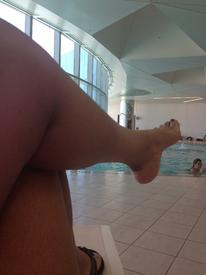Any pointers on how to break out of a plateau?

meyerstwilight6
Posts: 72 Member
So it seems I have hit a plateau. I haven't lost any weight in about a month despite being very consistent. I am wondering if changing my exercise routine would help? Any suggestions are appreciated!
0
Replies
-
increase your calories by 25% for 2 weeks...0
-
Obviously keep a close check on calories to make sure you are not slipping but starting 30 day shred and doing more vigorous exercise helped me to break a plateau. Just try something different, something that makes you feel like you've really exercised if you know what I mean. Oh and I'm from Manchester too, Manchester England that is - lol. Just checked your profile to find out how much weight you had left to lose0
-
You don't have your diary open so its hard to see what you've been doing calorie/food wise. Everyone says increase calories. It doesn't work for me. If I were you I would vary your calories. That busted me through a plateau fast. So if you average 1500 calories a day for example then you would be 1300 one day and 1700 the next day. It confuses your body and gets it moving again. Also try to switch up your workout routine.0
-
Have you really hit a plateau or has it only been a week or so without your weight going down? Do you take pictures? Measurements? When I hadn't lost for over a month, I finally took the time to read Helloitsdan's post (it's really not long, it just seems it) http://www.myfitnesspal.com/topics/show/654536-in-place-of-a-road-map-2-0-revised-7-2-12
But everyone is different. Like three said above me, we can't see your diary-maybe you're not eating enough protein, sodium is high, not enough water. Ect. just cause increasing your calories (unless you're really low to begin with) might not work for you but you need to give it time to change, it won't happen over night or even a week0 -
Here's what the Mayo Clinic has to say:
https://www.mayoclinic.com/health/weight-loss-plateau/MY01152
The lighter you become, the fewer calories you burn for the same amount of exercise.0 -
I had to increase my calories for a little bit and push it on my workouts..... I have only hit a plateau once about a year ago( I was down a lot more and gained it back). I worked out 2x a day for about a week and it kicked off the weight loss again. I went back to my regular routine and it kept dropping. Just stick with it and don't let it get you down!0
-
1.) Try intermitting fasting! This helped me a lot. This isn't a diet for itself, more a helpful technique.
The basic understanding behind this is, that the body learns to mobilize energy from your energy storage. In this opinion you don't have to be afraid that the body will eat "itself". Especially if you're still doing sports, the body will not eat muscles.
Anyway. Try for yourself. It is realy easy to follow. Then you will see if it works for you.
For example: Try eating all your calories in a window of 6-8 hours. Then try to fast the other 18-16 hours. (This is the so called leangains approach. If you google it, you will find a blog with the "founder"). Of course you should drink water in the meantime!
A normal day for me is:
5.45 a.m. Getting up, no breakfast, followed by a gym session or running
7.30 a.m. first meal, sometimes later
1- 3.00 p.m. my last meal
during the time from 6- to 3 i also eat some fruits/nuts.
So i eat from 6 a.m. to 3 p.m. Then i fast to 6 a.m. the next day!
2.) The human body is sneaky and evil. In sports you have to constantly challenge your body to be faster/stronger and so on. In my opinion this sometimes is the same thing, when you're trying to loose weight. So maybe try a low carb week or at least realy focus on low gi food. Something like that!0 -
Thank you for all the advice. I have a feeling my body started getting used to the amount of exercise and calories daily so I think I need to push myself harder, exercise wise. I will try that and see how it goes! :-)0
-
Is it actually possible to NOT lose
weight because you're eating too little?
Yes and no. This gets a little complicated so let me explain both sides.
Part one of my answer: I say NO, because if you are in a calorie deficit you
WILL lose weight.
Most people have heard anecdotes of the dieter who claims to be eating
800 calories a day or some starvation diet level of intake that is clearly in
a deficit and yet is not losing fat. Like the mythical unicorn, such an animal
does not exist.
Every time you take a person like that and put them in a hospital research
center or metabolic ward where their food can be counted, weighed, measured
and almost literally "spoon fed" to them, a calorie deficit always produces weight loss.
There are no exceptions, except possibly in rare diseases or mutations. Even
then metabolic or hormonal defects or diseases merely lead to energy imbalance
via increases in appetite, decreases in energy expenditure or changes in energy
partitioning. So at the end of the day it's STILL calories in versus calories out.
In other words, NO - it's NOT your thyroid (unless you've got a confirmed
diagnosis as such...and then guess what... it's STILL calories in vs calories out,
you're just not burning as many as someone should at your height and weight).
One famous study that was published in the New England Journal of Medicine
years ago proved this point rather dramatically. After studying obese people -
selected specifically because they swore they were eating less than 1200 calories
but could not lose weight - Steven Lichtman and his colleages at St. Luke's
Roosevent Hospital in New York came to the following conclusion:
"The failure of some obese subjects to lose weight while eating a diet they
report as low in calories is due to an energy intake substantially higher than
reported and an overestimation of physical activity, not to an abnormality
in thermogenesis."
That's right - the so-called "diet-resistant" subjects were eating more than they
thought and moving less than they thought. This was probably the single best
study ever published that debunks the "I'm in a calorie deficit but I can't lose
weight" myth:
Part two of my answer, YES, because:
1) Energy intake increases.
Eating too little causes major increases in appetite. With hunger raging out of
control, you lose your deficit by overeating. This happens in many ways, such
as giving in to cravings, binge eating, eating more on weekends or simply being
inconsistent, so some days you're on your prescribed 1600 calories a day or
whatever is your target amount, but on others you're taking in 2200, 2500,
3000 etc and you don't realize it or remember it. The overeating days wipe
out the deficit days.
2) Metabolism decreases due to smaller body mass.
Any time at all when you're losing weight, your metabolism is slowly decreasing
due to your reduced body mass. The smaller and lighter you get, especially if
there's a large drop in skeletal muscle mass, the fewer calories you need. So
your calorie deficit slowly shrinks over time as your diet progresses. As a result,
your progress slows down even though you haven't changed how much you eat.
With starvation, you always lose weight, but eventually you lose so much
weight/body mass that you can reach energy balance at the same caloric
intake you used to lose weight on. You might translate that as "I went into
starvation mode" which wouldn't be incorrect, but it would be more accurate
to say that your calorie needs decreased.
3) Metabolism decreases due to adaptive thermogenesis.
Eating too little also causes a starvation response (adaptive thermogenesis) where
metabolic rate can decrease above and beyond what can be accounted for from
the change in body mass (#2 above). This is "starvation response" in the truest
sense. It does exist and it is well documented. However, the latest research says
that the vast majority of the decrease in metabolism comes from reduced body
mass. The adaptive component of the reduced metabolic rate is fairly small,
perhaps 10% (ie, 220 calories for an average female with a 2200 TDEE). The
result is when you don't eat enough, your actual weight loss is less than
predicted on paper, but weight loss doesn't stop completely.
There is a BIG myth about starvation mode (adaptive thermogenesis) that
implies that if you don't eat enough, your metabolism will slow down so much
that you stop losing weight. That can't happen, it only appears that way
because weight loss stops for other reasons. What happens is the math
equation changes!
Energy balance is dynamic, so your weight loss slows down and eventually stops
over time if you fail to adjust your calories and activity levels in real time each
week.
So what can be done to stop this metabolic slowdown caused by low calorie
dieting and the dreaded fat loss plateau that follows? I recommend the
following 5 tips:
1) Lose the pounds slowly.
Slow and steady wins in long term fat loss and maintenance every time. Rapid
weight loss correlates strongly with weight relapse and loss of lean body mass.
Aim for one to two pounds per week, or no more than 1% of total body weight
(ie, 3 lbs per week if you weigh 300 lbs).
2) Use a higher energy flux program.
If you are physically capable of exercise, then use weight training AND cardio
to increase your calorie expenditure, so you can still have a calorie deficit, but
at a higher food intake (also known as a "high energy flux" program, or as we
like to say in Burn The Fat, "eat more, burn more.")
3) Use a conservative calorie deficit.
You must have a calorie deficit to lose fat, but your best bet is to keep the
deficit small. This helps you avoid triggering the starvation response, which
includes the increased appetite and potential to binge that comes along with
starvation diets. I recommend a 20% deficit below your maintenance calories
(TDEE), a 30% deficit at most for those with high body fat.
4) Refeed.
Increase your calories (re-feed) for a full day periodically (once a week or so if
you are heavy, twice a week if you are already lean), to restimulate metabolism.
On the higher calorie day, take your calories to maintenance or even 10, 15, 20%
above maintenance and add the extra calories in the form of carbs (carb cycling).
The leaner you get, and the longer you've been on reduced calories, the more
important the re-feeds will be.
5) Take periodic diet breaks.
Take 1 week off your calorie restricted diet approximately every 12 weeks or so.
During this period, take your calories back up to maintenance, but continue to
eat healthy, "clean" foods. Alternately, go into a muscle building phase if increasing
lean mass is one of your goals. This will bring metabolism and regulatory
hormones back up to normal and keep lean body mass stable.
Train hard and expect success,
Tom Venuto,
Author of Burn The Fat, Feed The Muscle
http://www.BurnTheFat.com0 -
Great quote and great advice @ rkr22401.Thanks for that bit of information.It should be passed around to all the forums0
-
from the mayo clinic: A plateau occurs because your metabolism — the process of burning calories for energy — slows as you lose muscle. You burn fewer calories than you did at your heavier weight even doing the same activities. Your weight-loss efforts result in a new equilibrium with your now slower metabolism.
At this new equilibrium, calories eaten equals calories expended. This means that to lose more weight, you need to increase activity or decrease the calories you eat. Using the same approach that worked initially may maintain your weight loss, but it won't lead to more weight loss.0 -
For advice to overcome plateaus join this group today Star moves .
http://www.myfitnesspal.com/groups/home/11189-star-moves-plateau-breakers0 -
Eat vegan for 30 days!0
This discussion has been closed.
Categories
- All Categories
- 1.4M Health, Wellness and Goals
- 398.1K Introduce Yourself
- 44.7K Getting Started
- 261K Health and Weight Loss
- 176.4K Food and Nutrition
- 47.7K Recipes
- 233K Fitness and Exercise
- 462 Sleep, Mindfulness and Overall Wellness
- 6.5K Goal: Maintaining Weight
- 8.7K Goal: Gaining Weight and Body Building
- 153.5K Motivation and Support
- 8.4K Challenges
- 1.4K Debate Club
- 96.5K Chit-Chat
- 2.6K Fun and Games
- 4.8K MyFitnessPal Information
- 18 News and Announcements
- 21 MyFitnessPal Academy
- 1.5K Feature Suggestions and Ideas
- 3.2K MyFitnessPal Tech Support Questions
Do you Love MyFitnessPal? Have you crushed a goal or improved your life through better nutrition using MyFitnessPal?
Share your success and inspire others. Leave us a review on Apple Or Google Play stores!
Share your success and inspire others. Leave us a review on Apple Or Google Play stores!










